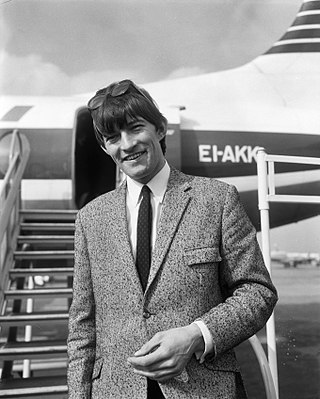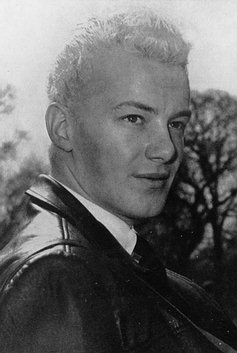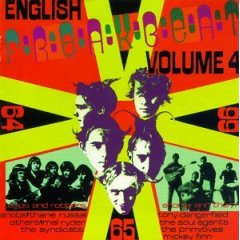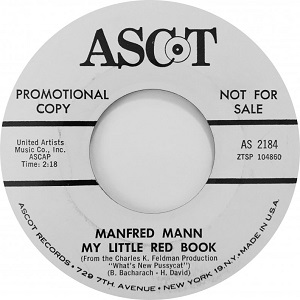Related Research Articles

Brian Samuel Epstein was an English music entrepreneur who managed the Beatles from 1961 until his death in 1967.

Gerry and the Pacemakers were a British beat group prominent in the 1960s Merseybeat scene. In common with the Beatles, they came from Liverpool, were managed by Brian Epstein, and were recorded by George Martin. Their early successes alongside the Beatles were instrumental in popularizing the Merseybeat sound and launching the wider British beat boom of the mid-1960s.
Beat music, British beat, or Merseybeat is a British popular music genre that developed, particularly in and around Liverpool, in the late 1950s and early 1960s. The genre melded influences from British and American rock and roll, rhythm and blues, skiffle, traditional pop and music hall. It rose to mainstream popularity in the UK and Europe by 1963 before spreading to North America in 1964 with the British Invasion. The beat style had a significant impact on popular music and youth culture, from 1960s movements such as garage rock, folk rock and psychedelic music.

Dave Berry is an English rock singer and former teen idol during the 1960s. His best-remembered hits are "Memphis, Tennessee", "The Crying Game" (1964) and his 1965 hit "Little Things", a cover version of Bobby Goldsboro's Stateside top 40 success.
Gerard Marsden MBE was an English singer-songwriter, musician and television personality, best known for being leader of the Merseybeat band Gerry and the Pacemakers. He was the younger brother of fellow band member Freddie Marsden.

The Remo Four were a 1950s–1960s rock band from Liverpool, England. They were contemporaries of The Beatles, and later had the same manager, Brian Epstein. Its members were Colin Manley, Phil Rogers, Don Andrew, and Roy Dyke (drums). Andrew and Manley were in the same class at school as Paul McCartney.

Heinz Burt was a German-born British rock and roll bassist and singer who performed under the stage name Heinz. He was also known as a member of the instrumental group the Tornados.

The Escorts were a Merseybeat band formed in October 1962 in Liverpool, England, by three classmates who had just left the Morrison School for Boys in Rose Lane, Allerton — Mike Gregory, Terry Sylvester and John Kinrade. In 1963, they were voted the ninth most popular group in Liverpool by readers of Mersey Beat magazine from a competitive field of several dozen popular Liverpool bands of the time.
Anthony F. J. Barrow was an English press officer who worked with the Beatles between 1962 and 1968. He coined the phrase "the Fab Four", first using it in an early press release.
The Big Three were a Merseybeat group from Liverpool. They are best known for their 1963 recording of "Some Other Guy" and their close connection to The Beatles.
"Please Stay", also known as "(Don't Go) Please Stay", is one of songwriter Burt Bacharach's early pop hits. It is an early hit of The Drifters featuring the new lead singer Rudy Lewis, who replaced Ben E. King and features Dionne Warwick's sister Dee Dee Warwick and Doris Troy on background vocals. This song, along with "Some Kind of Wonderful" and "Sweets for My Sweet", were recorded in the same session.

English Freakbeat, Volume 2 is a compilation album in the English Freakbeat series, featuring recordings that were released decades earlier, in the mid-1960s.
Sounds Incorporated, first recorded as Sounds Inc., was a British instrumental pop/rock group which recorded extensively in the 1960s.

English Freakbeat, Volume 4 is a compilation album in the English Freakbeat series, featuring recordings that were released decades earlier, in the mid-1960s.

English Freakbeat, Volume 5 is a compilation album in the English Freakbeat series, featuring recordings that were released decades earlier, in the mid-1960s.
The English rock band The Beatles auditioned for Decca Records at Decca Studios in West Hampstead, north London, on 1 January 1962. They were rejected by the label, who instead opted to sign a contract with Brian Poole and the Tremeloes. The audition was recorded, and five of the songs—"Searchin'", "Three Cool Cats", "The Sheik of Araby", "Like Dreamers Do" and "Hello Little Girl"—were officially released on the compilation Anthology 1 in 1995.
Peter Jay and the Jaywalkers were a British instrumental rock group in the early 1960s. Their biggest hit, "Can Can 62" reached the British singles chart in 1962. The group toured with The Beatles and The Rolling Stones before disbanding in 1966.

"My Little Red Book" (occasionally subtitled "(All I Do Is Talk About You)") is a song composed by American songwriter Burt Bacharach with lyrics by Hal David. The duo was enlisted by Charles K. Feldman to compose the music to Woody Allen's film What's New Pussycat? following a chance meeting between Feldman and Bacharach's fiancée Angie Dickinson in London. "My Little Red Book" was composed in three weeks together with several other songs intended for the movie. Musically, the song was initially composed in the key of C major, largely based on a reiterating piano riff performed. David's lyrics tells the tale of a distraught lover, who after getting dumped by his girlfriend browses through his "little red book" and taking out several girls to dance in a vain effort to get over her.

Charles Blackwell is an English arranger, record producer and songwriter.
References
- ↑ "Cryin' Shames (Paul And Ritchie The Crying Shames)". 45-rpm.org.uk. Retrieved 28 May 2019.
- ↑ "From Bumblies To Cryin'Shames - Mersey Beat". Triumphpc.com. Retrieved 28 May 2019.
- ↑ "The Cryin' Shames biography". Last.fm. Retrieved 28 May 2019.
- ↑ "MerseyCats - The Liverpool R 'N' R Childrens Charity-From Bumblies to Cryin Shames". Merseycats.com. Retrieved 28 May 2019.
- 1 2 "Cryin' Shames (Paul And Ritchie The Crying Shames)". 45-rpm.org.uk. Retrieved 11 October 2015.
- 1 2 "THE CRYIN' SHAMES 1966 (thecryinshames1966) on Myspace". Myspace.com. Retrieved 11 October 2015.
- ↑ Roberts, David (2006). British Hit Singles & Albums (19th ed.). London: Guinness World Records Limited. p. 129. ISBN 1-904994-10-5.
- ↑ "The Cryan' Shames | Biography & History". AllMusic. Retrieved 28 May 2019.
- ↑ "Richard (Ritchie) Routledge". Funeral Notices. 11 October 2023. Retrieved 11 October 2023.
- ↑ "Friendly Persuasion: Please Stay - The Cryin' Shames". AllMusic .